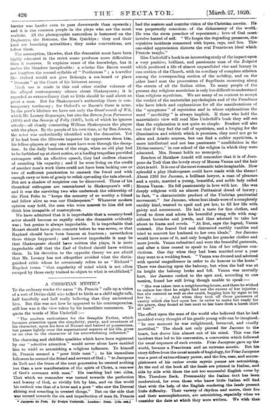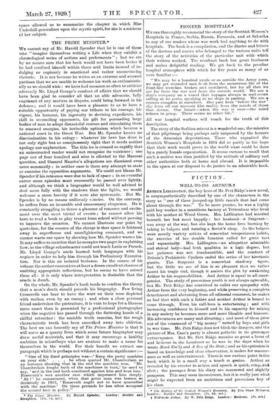A CHRISTIAN MYSTIC.* To the ordinary reader the name "St.
Francis" calls up a vision of a sort of Divine child who talked to birds as a child might talk, half fancifully and half really believing that they understood him. But this was not how he appeared to his contemporaries, still less was it the view taken by his immediate successors. To quote the words of Miss Underhill :—
"The modern enthusiasm for the Seraphic Father, which focusses attention upon the simplicity, gaiety, and sweetness of his character, upon his love of Nature and hatred of possessions.- but passes lightly over the supernatural aspects of his life, gives us no clue to the character of his overwhelming influence."
The charming and childlike qualities which have been registered by our "selective attention" would never alone have enabled him to wield so astonishing a religious influence. To himself St. Francis seemed a "poor little man " ; to his immediate followers he seemed the friend and servant of God ; "to Jacopone
da Todi and the friars of the next generation he seemed nothing less than a new manifestation of the spirit of Christ, a renewer of God's covenant with man.," His tesehing had two sides.
That which we remember was turned towards the perfection and, beauty of God, so vividly felt by him, and on this world his outlook was that of a lover and a poet" who saw the Eternal shiniOg and sounding in created things." But on the side that - was turned towards the sin and imperfection of man St. Francis
• Amps.. da44*. By avaya -lhaskebItt.- Loadea4- Diet.. L1ea-se.4 had -the austere and contrite visionof -the Christian. ascetic,. . Hi= was perpetually conscious, of the disharmony of the world..- He was the stern preacher -of -repentance;- love-of. God raustr
involve hatred of self: "We forget the degrading.penances; the repulsive incidents connected with lepers, raga, and lice. This one-sided appreciation distorts the real Franciscan ideal which Francis taught."
Miss Underhill's book is an interesting study of the impact upon a very positive; brilliant, and passionate man of the Zeitgeist which produced a life of almost unparalleled vice and luxury in one section of the Church, with its corollary of complete atheism among the corresponding section of the- nobility, and on the
other hand sent the processions of flagellants mourning along the streets of all the Italian cities. To many people of the present day religious asceticism is only less difficult to understand than religious mysticism. We are many of us content to accept the verdict of the materialist psychologists and of the Freudians who have labels and explanations for all the manifestations of the " symptoms " of mysticism and in whose explanations the
word " morbidity " is always implicit. If those who hold the materialistic view will _read Miss Underhill's book they will see-
that the. explanation is not quite so simple., Readers will also see that if they feel the call of mysticism, and a longing for the illumination and rebirth which it promises, they need not go to alien and Asiatic sources, but can find, a nobler mysticism, a
more intellectual and not less passionate "annihilation in the Divine essence," in. one school of the religion in which they were-
educated. Mts. Besant holds no -monopoly.
Readers of Matthew Arnold will remember that it is of -Jaw- pone da Todi that the lovely story of MormsVanna and the hair shirt is told. It is one of the most romantic tales imaginable. How splendid a play Shakespeare could have made -with- the theme!
About 1265 Ser Jaoomo, a brilliant lawyer, a-man nf- pleasure and a cynic, married -a young, beautiful, and noble- lady called
Momma Vanua., He fell Passionately in love with her. She was deeply religious with an almost Puritanical ,dread. of luxury ;
in fact,- "a characteristic product of the Umbrian penitential movement." Ser Jacomo, _whose bestideals were of a completely earthly kind, wanted to spoil and pet her,- to fill her life with gaiety and amusement. He had a taste for fine clothes, and loved. to dress and adorn- his beautiful young wife with mag- nificent brocades and jewels, and thus- adorned to take her about. to feasts and revels. "At first, says the legend,. Tama resisted. She feared God and distrusted earthly vanities and
tried to convert her husband to her own ideals." Ser-Jacomo.
would have none of it, and only bought her grander clothes and more jewels. Vanna submitted and wore the beautiful garments, and after a time ceased to speak to him of her religious con- victions. One day when they had been married over a year
they went to a wedding feast.. " Vanna;_was dressed and adorned with special magnificence in order to do honour to the hosts." There was dancing upon the balcony, but when the ball was at its height the balcony broke and fell. Vanna was mortally hurt. Ser Jaeomo rushed to the spot and, according to one veraion, found her still living though unable to speak :—
" She was taken into a neighbouring house,and there he wished to unlace her that he might find out the extent of her injuries ; but she resisted as well as she could, begging him by signs to let her- be. . . . And when they took off those garments of vanity which she had upon her in order to make her ready for the grave, they found at last next to her bare flesh a harsh shirt of
The effect upon the man of the world who believed that he had moulded every thought of his gentle young wife can be imagined.. "in one moment he was enlightened, bereaved, and cruelly mortified." The shock not only pierced Ser Jacomo to the
heart, -but drove- him almost out of his mind. This was- the- incident that led to his conversion, a ecniversion which followed • the usual sequence of such events. Friar Jacopone gave up the world, became a Francisoan and an extreme ascetic. But his, story differs from the usual annals of hagiology, for Friar Jacopone was a poet of extraordinary power, and the fire, ease, and accom- plishment of his rather erotic mystic poems- are astonishing. At the end of -the book all the-laud& are printed in Italian, and- side by side with them the not too successful English verse -by-
Mrs. Theodore Beck. Presumably the Italian- text has been- modernized, for even those who know -little Italian will find.,
that, with- the help of the English- rendering- the- ireultr. present, little difficulty, Their variety- of- rhythm- sad metre, -their fire and their accomplishment, are astonishing, especially when wer consider the date at which they were written. We wish. that
space allowed us to summarize the chapter in which Miss Underhill generalizes upon the mystic spirit, for she is a mistress of her subject.



































 Previous page
Previous page